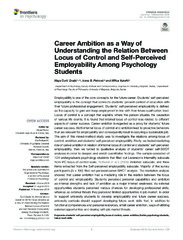Приказ основних података о документу
Career Ambition as a Way of Understanding the Relation Between Locus of Control and Self-Perceived Employability Among Psychology Students
| dc.creator | Curić-Dražić, Maja | |
| dc.creator | Petrović, Ivana | |
| dc.creator | Vukelić, Milica | |
| dc.date.accessioned | 2021-10-12T12:45:36Z | |
| dc.date.available | 2021-10-12T12:45:36Z | |
| dc.date.issued | 2018 | |
| dc.identifier.issn | 1664-1078 | |
| dc.identifier.uri | http://reff.f.bg.ac.rs/handle/123456789/2582 | |
| dc.description.abstract | Employability is one of the core concepts for the future career. Students' self-perceived employability is the concept that connects students' present context of education with their future professional engagement. Students' self-perceived employability is defined as the capacity to gain and keep employment in line with their future qualification level. Locus of control is a concept that explains where the person situates the causation of various life events. It is found that internal locus of control was related to different aspects of career success. Career ambition is regarded as a proxy for students' future career success. Both internal locus of control and ambition lead to proactive behaviors that are relevant for employability and consequently result in securing a sustainable job. The aim of this mixed-method study was to investigate the relations among locus of control, ambition and students' self-perceived employability. Firstly, we tested mediating role of career ambition in relation of internal locus of control and students' self-perceived employability, then we turned to qualitative analysis of students' career self-SWOT analyses in order to deepen and enrich quantitative findings. The sample consisted of 124 undergraduate psychology students that filled out Levenson's Internality subscale from IPC locus of control scale, Rothwell et al.' s (2008) Ambition subscale, and three items extracted from the Self-perceived employability subscale. Majority of the survey participants (N = 100) filled out personal career SWOT analysis. The mediation analysis showed that career ambition had a mediating role in the relation between the locus of control and employability. Students perceived personal capabilities and ambition as internal strengths and lack of ambition as a major internal weakness. As external opportunities students perceived various chances for developing professional skills, whereas as external threats they perceived limited opportunities in job market. In order to support university students to develop employability and future career success, university curricula should support developing future work skills that, in addition to functional competences and personal resources, entail career ambition, ways of utilizing external opportunities and dealing with job market threats. | en |
| dc.publisher | Frontiers Media Sa, Lausanne | |
| dc.relation | Ministry of Education, Science and Technological Development of the Republic of Serbia | |
| dc.rights | openAccess | |
| dc.rights.uri | https://creativecommons.org/licenses/by/4.0/ | |
| dc.source | Frontiers in Psychology | |
| dc.subject | students' self-perceived employability | en |
| dc.subject | Serbia | en |
| dc.subject | psychology students | en |
| dc.subject | locus of control | en |
| dc.subject | future work skills | en |
| dc.subject | career ambition | en |
| dc.title | Career Ambition as a Way of Understanding the Relation Between Locus of Control and Self-Perceived Employability Among Psychology Students | en |
| dc.type | article | |
| dc.rights.license | BY | |
| dc.citation.other | 9: - | |
| dc.citation.rank | M21 | |
| dc.citation.volume | 9 | |
| dc.identifier.doi | 10.3389/fpsyg.2018.01729 | |
| dc.identifier.fulltext | http://reff.f.bg.ac.rs/bitstream/id/1292/2579.pdf | |
| dc.identifier.pmid | 30283381 | |
| dc.identifier.scopus | 2-s2.0-85053476848 | |
| dc.identifier.wos | 000445081700003 | |
| dc.type.version | publishedVersion |

